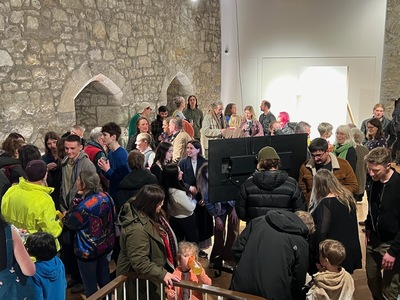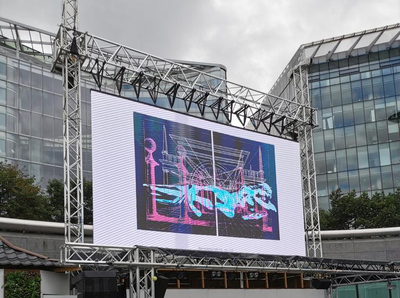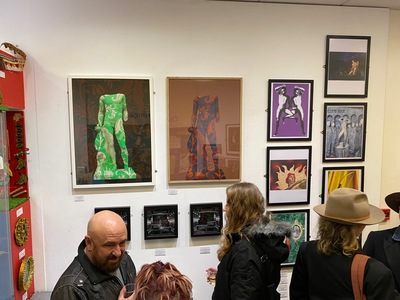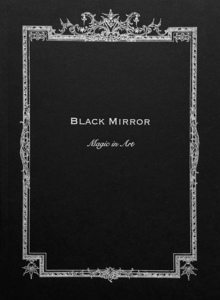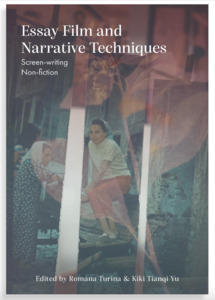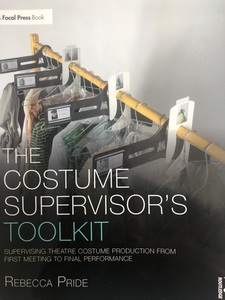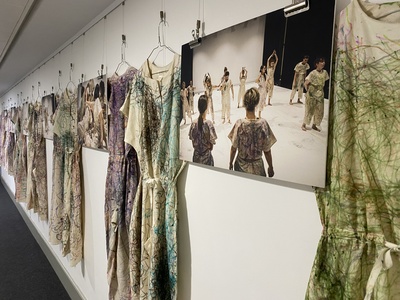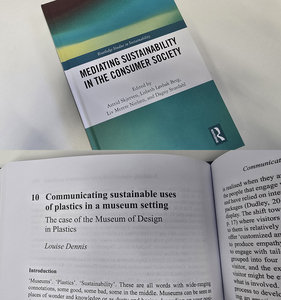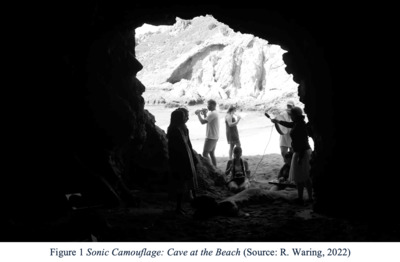Underline, a series of three open-air public film and live performance events (2022 – present), that re-purpose urban public space through artistic intervention into one of active co-existence and co-experimentation. In this text we describe and assess the potential of reimagining urban space through artistic research, creative participation, collective engagement, and reflect on its impact.
Underline has served as the closing event of the community art project Beyond Beck Road, which is part of the Open House Festival London, for the last three years. The event takes place in a historic East London terraced street, Beck Road, endeavouring to rethink the location’s purpose through performative engagement, addressing ideas of community and creative interaction. The Underline programme features an open call and invited participants, first time and established local and international filmmakers and artists.
For the event the road is closed to traffic and cars are removed, creating an open and unencumbered space. The linear street is bisected by a railway line, running to and from Liverpool Street station and the road itself passes under one of the arches - it is here that Underline takes place. The location is transformed through the application of a paper skin onto the bricks surface, becoming a screening/performance space. The papered wall, which is usually overlooked, becomes a ‘screen’ and backdrop that serves as a shared stage, connecting the domestic and public, creating a ‘common’ space that encourages investigative and instructive exchange. European Heritage Days who contributed to the funding for the second iteration of Beyond Beck Road, stated, it ‘was a reminder of the richness of the European approach to heritage — of celebrating architecture and neighbourhoods not just for their aesthetics or rarity, but as a resource and platform for participation, learning, and creativity.’ (2022)
Activities, such as Underline, have transformative potential, in that they engender a spirit of cooperation and co-experimentation through positively emphasising ‘place attachment’ and ‘identity’, which influences ‘individual and group behaviour’, and ‘person-environment transactions.’ (Manzo & Perkins 2006: 337; 347) We do not overstate the impact of such initiatives, but it is our contention that they do actively contribute to placemaking, adding to the ‘always in-the-making’ of common space. (Stavrides 2016: 54) The temporality of Underline does not negate its communal impact because, ‘Understanding art not in, but as public space – to use a distinction by art theorist Miwon Kwon – might be one of the most important contributions of a performative curating that puts its focus on creation of a (temporary) community and spaces of meditation.’ (Warsza & Malzacher 2017: 13) This offers advantages for rethinking urban spaces and ‘commoning’ it to make it redolent with creative and interactive opportunity.
Underline’s circumstances create a ‘temporary reality’ that connects to other realities, its umbrella’ configuration makes for a ‘relational encounter’ that is ‘porous’, producing a pluralistic situation. (Jackson, 2017: 32) Its setting, with all the inherent polyphonic ‘messiness’ of a real location, allows ‘deciphering’ to be open and associative, an act of de-coding and potentially re-coding, to generate a myriad of diverse views that draw on personal engagement and can offer mutual benefits.
It has been proposed that an academic ‘culture of quality’ is ‘produced at the confluence of students, programme content, the teacher, the planned teaching activities, and the teaching culture and traditions of the university.’ (Bell 2013: 146) We believe, this notion can be expanded beyond these confines to other places of potential learning. In this understanding a discursive space is actively created, and in time this reflective approach becomes embedded in the fabric of the form, reenforcing critical and creative awareness and development; part of this adoption (consciously or unconsciously) is due to expanded opportunity and inclusivity.
This project concurs with Decandia’s description of a polyphonic urban score, the development of a context and composition that can, ‘open up affective, vital relations with places once more and to produce, make dynamic, put into circulation and socialise a collective intelligence.’ (2014) The described activities have evolving potential in their ability to bring individuals together through collective and relatable interests using co-experimentation in a manner that is political and timely.
The worth of Underline's method and example was acknowledged through an invitation to present an overview of its activities at ECOPOS: For Responsible Technological & Digital Horizons: Education, Health & Transitioning Cities (Catholic University of Lille, France, 9-11 October 2024) as part of the Citizen Participation, Science, Technology, and Art for Sustainable Cities session. It has also inspired co-authored paper for the internationally renowned artistic research publication RUUKU, issue: Dreaming the City for Real (pending).
This a short introductory video - https://vimeo.com/1020651164?share=copy




 Lists
Lists Lists
Lists![Underline [thumbnail of Underline]](https://research.aub.ac.uk/503/2.haslightboxThumbnailVersion/IMG_8225.jpeg)

